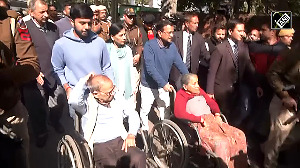
Standing in a corner of the colourful tent, a few steps from the excited crowd, 15-year-old Priyanka Silvadasan was a bundle of nerves. The names were being called out, and one by one her neighbours came to take the token handed out to them by Father Stanley, the chief parish priest of the St Mary's Church in Colachel.
Priyanka had seen the village prepare for the evening through the day. 'Welcome' streamers in golden paper had been festooned on the doors of the first four shelters; red ribbons tied at the thresholds; bouquets made for the district collector; and aarti thaalis readied for the traditional Indian welcome.
The tsunami had deprived the fishing colony of their homes, and the new shelters were very small but this could hardly rob the housewarming of ceremony and prayer. Father Stanley arrived from the church in a white Ambassador after being offered a ride by visitors headed in the same direction. After being welcomed with a kumkum tikka on his head, the kindly priest in a white robe, supervised the name list, ensuring none was left out.
96 names would be called out today in the presence of District Collector Sunil Paliwal, who had arrived dot on time. 96 families would move into the temporary homes made by the charity SOS Children's Village of India. They would receive provisions and utensils to set up their home and till the permanent homes promised by the government were ready this was to be their home.
| Fact Sheet |
|
Village of Singaravelan is in Colachel, near Kanyakumari |
|
840 people died in the tsunami in Kanyakumari district |
|
33 coastal villages were affected |
|
3,400 temporary huts have been constructed. |
But for Priyanka and her family, there was no reason to cheer. The word doing the rounds in their colony of Singaravelan was that her family's name did not feature on the list. The plump lady who had been designated as a spokesperson of sorts for the colony had told them this repeatedly and the family had turned to their youngest daughter.
Priyanka was the only member of the family who could make their case eloquently in English, and it was left to her to make the family's case to the district collector, an enthusiastic and hands-on bureaucrat who joined the Indian Administrative Service after graduating from IIT-Kanpur and finishing a doctorate from America.
Silvadasan, her father was a fisherman who had owned two small boats before the tsunami destroyed them. He could take on the vagaries of the sea, was certain he could rebuild his life from scratch once he got his boat back, but did not have the confidence to intercede with the collector that day. His daughter had saved them when the sea had raged on December 26, he trusted her to take them through yet again.
"I told my parents to run to the terrace instead of trying to reach the road behind our house," said Priyanka, "I thought it would be impossible for us to get there because a canal flows between the road and the house. Since there is only a small bridge connecting the village to the road, we would have lost time if we tried getting to the bridge."
That morning their family of three -- her older sister Ancy was visiting her grandmother -- were about the house when an aunt telephoned telling them about the tsunami. The Silvadasans switched their television on and saw the news flash. Their home was just a few metres away from the sea, they looked out and a gigantic wall of water was destroying everything in its path.
The family heeded Priyanka's advice and rushed to the terrace, holding on to each other in fright. The water demolished their boundary wall and leapt up, touching the parapet of the terrace, a few inches away from the crouching family. Then in a split second it ballooned through the ground floor and it was over.
 When the family came down, the house had been swept off all its belongings. Fifteen of the 30 gold sovereigns Silvadasan had bought for his daughters were locked in the cupboard but there was no sign of the closet. "The only thing that was left was this broken sofa," he says pointing to the sofa in the room.
When the family came down, the house had been swept off all its belongings. Fifteen of the 30 gold sovereigns Silvadasan had bought for his daughters were locked in the cupboard but there was no sign of the closet. "The only thing that was left was this broken sofa," he says pointing to the sofa in the room.
He had sold his big boat and built this house a few months ago and what remained was broken doors and broken glass. "I had put all my savings in building this house and now I have lost it all." Silvadasan sighed.
The concrete house stands like a framework with a strange hollowness inside, its emptiness accentuated by the clean floor. Every day, the family returns to this house from their rented room in the market to clean it and spend time there. Priyanka said some aid distributed by charities had bypassed them because people thought they were better off than the rest because they still had a home.
"We were told we would not get a temporary shelter because our house is still standing," she says, "We have nothing else to live by? If we don't get a house we will not even be entitled to the ration, what will we eat then?"
For a 15 year old, Priyanka makes her case with profound passion. But all her adult-like maturity cannot hide the ruings of a teenager who has lost every precious thing she ever owned. "Not one of my dresses could be saved. I lost everything that was mine."
So it was in borrowed clothes that she stood beside her older sister in the tent as the names were called out. Sunil Paliwal, the district collector, sat on a plastic chair unaware of the nervous girl behind him until she was gently pushed forward.
While she put her family's case, explaining that they needed a shelter because their home was damaged and they had no food, tears ran down her face. The collector heard her, asked for the list and turned the pages looking for the Silvadasans' name.
Towards the end, somewhere in the 90s was their name. Sunil Paliwal pointed it to her and Priyanka smiled, blurting an embarrassed thank you. Then turning back towards her parents, she said, "Number 92 is ours."
Photographs: Paresh Gandhi/India Abroad
Image: Uday Kuckian
Also Read: Tsunami: The complete coverage






 © 2025
© 2025